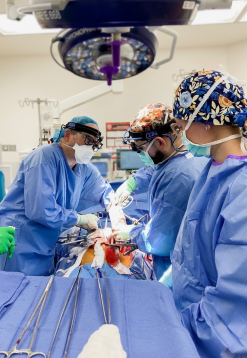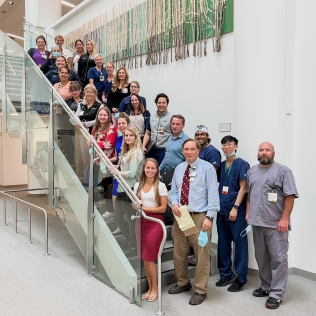Program objectives
The Urology Residency program is dedicated to providing residents with the basic science knowledge, clinical acumen, and surgical skills sufficient for the academic or private practice of urology at graduation. The program encompasses the scientific basis of urological pathophysiology and therapeutics, clinical diagnosis and management, surgical technique, and socioeconomic perspectives of the practice of urology.
The program emphasizes one-on-one interaction between the faculty and residents, fostering an apprenticeship style. A resident progress at his or her own pace rather than by rank. Residents at all stages are involved in patient management from the first office visit through surgery and post-operative follow-up.
Residents are exposed to the continuum of urological care in diverse settings, including the inpatient service, consultation service, ambulatory surgical unit, outpatient clinic, and emergency and urgent care settings. Residents gain fluency in all major surgical cases under direct supervision of the attending surgeon.
Residents also acquire a robust understanding of the principles of clinical and applied research through monthly Journal Club discussions and independent scholarship.
Program structure
Two residents are accepted annually. As of 2019, all five years of urology residency are under the auspices of urology. The first year encompasses six to seven months of integrated general surgery and surgical disciplines and three to four months of urology. There are a total of ten residents in the program. Eleven faculty members at Dartmouth Hitchcock Medical Center and the VA provide a complete range of subspecialty urological training.
The program involves the Section of Urology and the Department of Surgery at Dartmouth Hitchcock Medical Center (including Mary Hitchcock Memorial Hospital, Dartmouth Hitchcock Clinics, Norris Cotton Cancer Care Pavilion Lebanon, Children’s Hospital at Dartmouth Hitchcock Medical Center, and Geisel School of Medicine at Dartmouth), White River Junction Veterans Affairs Medical Center, and Concord Hospital. Read more about our facilities.
Residents gain balanced exposure to general and subspecialty urology across the curriculum, including six months as a Senior Resident at the Veterans Affairs Medical Center. The final Chief year is spent at Dartmouth Hitchcock Medical Center with six months as administrative Chief Resident. Robust experience in open, traditional laparoscopic, and robotic-assisted (da Vinci Xi Surgical System) laparoscopic surgical techniques is emphasized.

